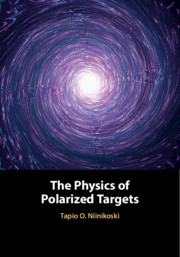Book contents
- The Physics of Polarized Targets
- The Physics of Polarized Targets
- Copyright page
- Dedication
- Contents
- Preface
- Acknowledgements
- 1 Introduction to Spin, Magnetic Resonance and Polarization
- 2 Resonance and Relaxation of Interacting Spin Systems
- 3 Electron Paramagnetic Resonance and Relaxation
- 4 Dynamic Nuclear Polarization
- 5 Nuclear Magnetic Resonance and Relaxation
- 6 NMR Polarization Measurement
- 7 Polarized Target Materials
- 8 Refrigeration
- 9 Microwave and Magnet Techniques
- 10 Other Methods of Nuclear Spin Polarization
- 11 Design and Optimization of Polarized Target Experiments
- Appendices
- Index
- References
10 - Other Methods of Nuclear Spin Polarization
Published online by Cambridge University Press: 03 February 2020
- The Physics of Polarized Targets
- The Physics of Polarized Targets
- Copyright page
- Dedication
- Contents
- Preface
- Acknowledgements
- 1 Introduction to Spin, Magnetic Resonance and Polarization
- 2 Resonance and Relaxation of Interacting Spin Systems
- 3 Electron Paramagnetic Resonance and Relaxation
- 4 Dynamic Nuclear Polarization
- 5 Nuclear Magnetic Resonance and Relaxation
- 6 NMR Polarization Measurement
- 7 Polarized Target Materials
- 8 Refrigeration
- 9 Microwave and Magnet Techniques
- 10 Other Methods of Nuclear Spin Polarization
- 11 Design and Optimization of Polarized Target Experiments
- Appendices
- Index
- References
Summary
Methods other than DNP may also produce high nuclear spin polarization, either in thermal equilibrium with the solid lattice, or in dynamic equilibrium in a rotating frame. Optical pumping methods create a very high enhancement of the nuclear spin polarization based on spin exchange collisions with atoms whose outer electron is polarized by circular polarized light. Some methods are also based on creating high non-equilibrium polarization that is then frozen in by increasing the spin–lattice relaxation time. Chemical and biomedical research teams use the term “hyperpolarization” to describe the general methods of spin polarization enhancement beyond thermal equilibrium; DNP methods belong clearly to these. Other methods include optical pumping and chemical polarization methods such as Chemical Induced Dynamic Nuclear Polarization (CIDNP) and Parahydrogen Induced Polarization (PHIP).
Keywords
- Type
- Chapter
- Information
- The Physics of Polarized Targets , pp. 421 - 435Publisher: Cambridge University PressPrint publication year: 2020

